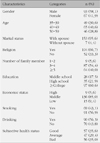Abstract
Purpose
The main purpose of this study was to examine factors influencing depression in middle aged people in relation to powerlessness, social support, and sociodemographic variables.
Methods
The questionnaire survey was carried out with a convenience sample of 160 middle aged people in a community setting. The data analysis procedures included frequency, t-test, ANOVA, Pearson correlation coefficients, and stepwise multiple regression using depression as the dependent variable.
Results
The prevalence of depression was 44.4%. There were significant differences in depression by number of members in the family, education, economic status, and subjective health status. Powerlessness was significantly different according to gender, economic status, and subjective health status. and social support according to economic status and subjective health status. Depression showed significant correlations with powerlessness and social support. Stepwise multiple regression revealed that factors significantly affecting variance included economic status, number of members in the family, powerlessness, and social support. These factors explained 43% of variance in depression.
Figures and Tables
Table 3
Difference of Depression, Powerlessness, and Social Support according to General Characteristics (N=160)

References
1. Cho KS, Lee KY, Kim SY. A study on the powerlessness, self-esteem, and family support of elderly home residents. J Korean Acad Adult Nurs. 1999; 11:436–448.
2. Choi SJ. Perceived powerlessness in hospitalized elderly patients. J Korean Acad Adult Nurs. 2001; 13:601–609.
4. Hammer C, Martsolf DS, Zeller RA. Depression and codependency in women. Arch Psychiatr Nurs. 1998; 12(6):326–334.

5. Johnstone EC, Hay AG, Bancroft J. Affective symptoms in women attending menopause clinic. British Journal of Psychiatry. 1994; 164:513–516.
6. Kilcoyne M, Dowling M. Working in an overcrowded accident and emergency department: Nurses' narratives. Aust J Adv Nurs. 2008; 25(2):21–27.
7. Kim EJ. A study on the relationship between perceived family support and powerlessness of OS operation patients. Gwangju: Chonnam National University;2001. Unpublished master's thesis.
8. Kim JS, Shin KR. A study on depression, stress, and social support in adult women. J Korean Acad Nurs. 2004; 34:352–361.

9. Kim NJ, Chun YI. The relation between depression symptoms or their health condition and the degree of exercise in middle-aged women. Korean J Phys Educ. 2003; 42(2):83–92.
10. Kim SS. The associated factors with the depression of middle-aged women living in a city. Gwangju: Chosun University;2000. Unpublished doctoral dissertation.
11. Ko SH, Lee EJ. Perceived social support and discerned powerlessness of the elderly residing in a rural community. J Korean Acad Adult Nurs. 1999; 11:107–118.
12. Lee JI, Kim KH, Oh SH. Depression and life satisfaction of middle-aged man. J Korean Acad Adult Nurs. 2003; 15:422–431.
13. Lee SS, Choi WH. A study on the prevalence of depression in middle aged women-based on women living in Geoje City-. J Korean Acad Psychiatr Ment Health Nurs. 2006; 18:105–115.
14. Kim JH, Lee YJ. A Study of andropause symptoms and life satisfaction among middle-aged Men. J ournal of Korean Academy of Community Health Nursing. 2005; 16:186–195.
15. Milberg A, Strang P, Jakobsson M. Next of kin's experience of powerlessness and helplessness in palliative home care. Support Care Cancer. 2004; 12(2):120–128.

16. Miller JF. Powerlessness: Coping with chronic illness. Philadelphia: F. A. Davis Company;1983.
17. Munakata T. Health and illness in behavioral science. Tokyo: Medikaru Hurendo Sha;1996.
18. Nishizono HN. Depression and neurosis in middle aged. Jpn J Clin Psychiatry. 1985; 14(9):1301–1307.
19. Okonogi L, Fukatsu C, Ohno Y. Handbook of psychiatry. Osaka: Sogensha;1998.
20. Olofsson B, Bengtsson C, Brink E. Absence of response: A study of nurses' experience of stress in the workplace. J Nurs Manag. 2003; 11(5):351–358.

21. Park HJ, Park TJ. A study on life-events stress and depression among middle-aged women. Res Article. 1998; 5:96–140.
22. Park SY. The relationship among family support, powerlessness and depression in the elderly patient. J Korean Acad Adult Nurs. 1999; 11:425–435.
23. Sandanger I, Nygard JF, Sorensen T, Moun T. Is women's mental health more susceptible than man's to the influence of surrounding stress? Soc Psychiatry Psychiatr Epidemiol. 2004; 39:177–184.

24. Shin HS. Effects on depressive disposition of middleaged women by style of living. Korean J Woman Psychol. 2002; 7(1):29–45.
25. Shin JS. Effects of the range on motion exercise on selfcare activities and depression. Seoul: Yonsei University;1985. Unpublished doctoral dissertation.
26. Shin KR. A study on depression among mid-aged women. J Korean Acad Adult Nurs. 1999; 11:858–870.
27. Tae YS. A study on the correlation between perceived social support and depression of the cancer patients. Seoul: Ewha Womans University;1985. Unpublished master's thesis.
28. Woo GM, Lee MH. An effect of beach ball play for depression, powerlessness, self-esteem, activity of daily living in stroke patients. Korean J Rehabil Nurs. 1998; 1(1):15–25.
29. Yu SJ, Yang S, Yoon JY. The relationship among depression, social support, and gender role barrier in middle aged women. J Korean Acad Psychiatr Ment Health Nurs. 2000; 9:619–630.
30. Zung WW, Broadhead WE, Roth ME. Prevalence of depressive symptoms in primary care. J Fam Pract. 1993; 37:337–344.




 PDF
PDF ePub
ePub Citation
Citation Print
Print






 XML Download
XML Download